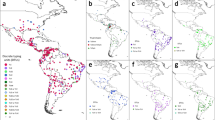Abstract.
Trypanosoma cruzi populations are characterized by diverse morphology, heterogeneous biological behavior, high genetic variability, and distinctly different clinical courses. The first objective of this work was to characterize different strains of T. cruzi with various molecular markers [simple-sequence-repeat PCR, randomly amplified polymorphic DNA (RAPD)-PCR, mini-exon genes]. All examined strains could be divided into two major lineages. Only one strain showed a different banding pattern in RAPD-PCR, which could be a further indication of the existence of a third lineage. The second aim was to examine the biological behavior of the different strains. Two animal models, Calomys callosus and Mus musculus, were infected. The results provide strong evidence that the biological behavior of the strains is not only lineage-specific. It appears that all factors, such as the infecting strain belonging to a certain lineage, the predominant morphological form of the isolate, and the immune response of the respective infected host, play an important role in the course of this infection.
Similar content being viewed by others

Author information
Authors and Affiliations
Additional information
Electronic Publication
Rights and permissions
About this article
Cite this article
Dost, .C., Albuquerque, .S., Hemleben, .V. et al. Molecular genetic characterization of different Trypanosoma cruzi strains and comparison of their development in Mus musculus and Calomys callosus . Parasitol Res 88, 609–616 (2002). https://doi.org/10.1007/s00436-001-0553-8
Received:
Accepted:
Issue Date:
DOI: https://doi.org/10.1007/s00436-001-0553-8



